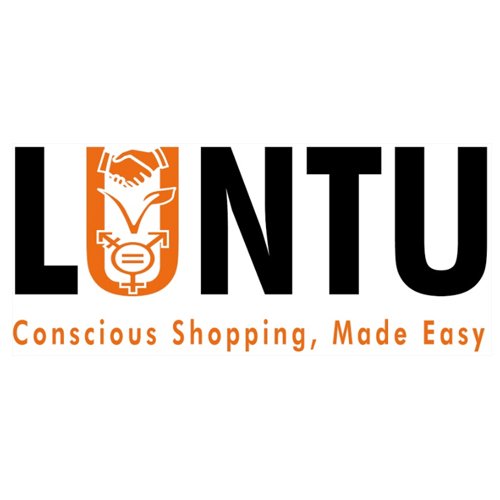Founder Feature: Amahle Ntshinga, Founder of LUNTU
Amahle Ntshinga is an award-winning Social Entrepreneur, Activist, and Owner and Founder of LUNTU. LUNTU is an e-commerce platform with the goal of helping boost South Africa’s economy by enabling the power of consumers to by conscious products and goods. Discover her founder story below →
Q: What inspired LUNTU?
AN: I’ve wanted to be an entrepreneur since I was 8 years old, I just did not know what type of business I wanted to start. When I was in Business School, I got a better understanding of how hard it is to grow a successful business in South Africa, our high unemployment rates, and the socioeconomic issues that affect Black and Brown South Africans. Thus, I wanted to do something to help.
Whilst still in Business School, I was watching the show Being Mary Jane. Gabrielle Union’s character was a well-off Black woman who grew up in an upper-middle-class family and she cared about the upliftment of the Black community. I resonated with her character a lot. In the show, her character got called out for essentially not putting her money where her mouth is because she didn’t seem to support Black-owned businesses that much, even though she could afford to. I felt that in my soul, because I didn’t support Black businesses that much either and I started asking myself why. I realized it’s because I did not know which businesses were Black-owned and/or how to buy their products.
I wanted to buy Black, and I checked online for a site that sells Black-owned products and I fell short. In that moment, I learned there was a gap in the market and I decided to fill that gap with LUNTU.
“I am motivated by fulfilling my childhood dreams and helping our LUNTU vendors get more sales. I am inspired by remembering that when LUNTU does well, so do our vendors and all of us will be able to provide good, well-paying jobs for South Africans and help our communities get economic liberation.”
— Amahle Ntshinga, Founder of LUNTA
Q: how do you stay inspired?
AT: South Africa is the most economically unequal country in the world and that is largely based on race, due to our Apartheid legacy. Over 70% of LUNTU vendors are micro-to-medium-sized businesses owned by a Black South African. Additionally, in South Africa’s National Development Plan, they state that one of their strategies to grow our economy is to grow local micro-to-medium sized businesses and most local businesses shut down before year 3. I stay inspired by thinking in the future and remaining hopeful that LUNTU and all our vendors will be able to grow into successful companies that treat their employees well and help grow our economy.
Q: Tell us about the process of creating the LUNTU index, how did you create the categories? Have they shifted? How does it apply to your business?
AN: I came up with the idea for LUNTU in 2016, but I only launched LUNTU in 2020. In that time, the indexes have grown tremendously. In 2016 LUNTU only had 3 LUNTU Indexes: Black-owned, woman-owned, and South African-owned. By the time we launched in 2020, we had 12 LUNTU Indexes that included LGBTQ+ owned, person(s) with a disability owned, eco-friendly, vegan, made in South Africa, and more. Today we have 15 LUNTU Indexes and honestly, I want to add even more. The older I get, the more issues I learn about and, thus, the more issues I care about.
The LUNTU Index applies to LUNTU because we want each LUNTU customer to have the transparency to use their purchasing power as they wish. Some people care about gender liberation, others sexuality liberation, others Black liberation, others the environment and people like me care about all of the above. Thus, when you use the LUNTU Index you can see exactly what type of product you are buying so that you can navigate through capitalism in a way that feels most comfortable to you.
Q: Beyond LUNTU, your educational materials on instagram and tiktok have raised the collective consciousness around gbv and misogyny, is there anything behind the scenes we should look out for? (we love your message so much!)
AN: Thank you so much! Yes, there is:
I am working with a group of people and grassroots organizations to implement effective and inclusive anti-GBV education in all South African schools, to help decrease our GBV rates. Please may everyone reading this sign the Teach Safety Now petition to help make this happen. The link is in my bio.
I am a stakeholder in Wits Activate, which is an award-winning LGBTQ+-focused community organization led by Wits students. Wits is one of the best universities in South Africa, and I am a Wits Business School alumnus. I know the team would appreciate everyone’s support.
We are in the early stages of organizing a peaceful protest outside of the Iranian embassy in South Africa to stand in solidarity with the women in Iran. We hope to get support in spreading the message and would like to see people in other countries to also host peaceful protests for the women of Iran, if feasible.
Q: What advice would you give an aspiring entrepreneur looking to make their first investment in their business?
AN:
Believe in yourself, despite what anyone has to say
It’s a marathon, not a sprint. Take your time, don’t be too hard on yourself
Don’t work in isolation. Join networking groups. Find people online with shared interests and support each other. Ask for help. Attend networking events. Check your emails and say yes to the things people in your space invite you to. Consider creating your own networking events, too, even if it’s a “live” call on social media, a zoom meeting with like-minded people, and more. Even if you work alone, find a way to build a community of other people in your space and this can be done digitally too.
Put yourself out there. You may feel nervous or shy, but oftentimes the most successful people are the ones who are able to reach out to strangers, share content online and ensure that people know about them and/or their business.
Ensure that you’re in it for the long haul. Just because your business does not rake in 7 figures in the first year, does not mean that it won’t in the third year. Remember, most businesses take at least 3 years before they become profit-generating, so do not be too hard on yourself if it takes a few years before you see tangible progress.
Keep on learning and this can be done for free. There are so many educational YouTube channels, podcasts and more. It’s also very important to familiarise yourself with business language and to understand various types of fundraising options, to prepare yourself for when you get an investor.
Be open to pivoting if you see what you’re currently doing is not working, be agile. You can learn what’s not working from tracking your success, customer feedback, and user testing.
Try to get into a good accelerator program or an incubator.
Take care of your mental health and congratulate yourself for all of your wins. Both big and small!
Do work that you actually care about and not just because you think will be successful.
It is important to plan, but don’t allow yourself to be stuck in the planning phase for too long. Your business won’t start until you open it.
Make sure you have all your paperwork in place. A lot of banks, accelerator programs, investors, and more will not engage with you unless you have your paperwork i.e., company registration certificate.
Spend your money wisely and always keep savings.
Be informed on what’s happening in your industry and who your competitors are, the latest trends, new customer expectations, latest tech, and more.
Build a good team of people who truly believe in your business and make sure that they work with you, and not for you. There is a difference between a boss and a leader. Be a leader!
Have fun!
Q: Three words to describe being a social entrepreneur?
AN: Grow business responsibly
Q: What does feminism mean to you?
AN: Honestly, I identify as a womanist. What it means to me is doing what you can to help us a achieve gender liberation, whilst centering the most marginalized. Sometimes, “doing what you can” means changing your beliefs and/or the way you operate in your community i.e. the idea that boys are easier to raise, shaming sex workers, turning a blind eye to sexist “jokes”, raising children differently based on gender, shaming women who don’t want kids, turning a blind eye to transphobia, what you look for in a political leader etc. Change comes from within, not everyone is meant to be an activist and that’s okay, but if we can all unlearn our patriarchal ideas, I think that’s womanism.
LUNTU delivers conscious products to 27 countries in 6 continents. To see the full list, you can find it on their website: www.luntu.co and/or Instagram @luntu.co






